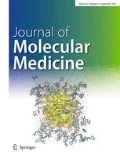Abstract
Many drugs of abuse, administered repeatedly over time, cause physical dependence which is expressed by a withdrawal syndrome when the drug is removed from the system. These processes can be thought of as adaptations of the neuronal system to an altered pharmacological state. The molecular mechanisms underlying these adaptations are still not known. A considerable amount of evidence is accumulating which implicates alterations in several components of the cAMP signal transduction cascade in these drug-induced processes. The transcription factor cAMP response element binding protein (CREB) in particular has been shown both in vitro and in vivo to be altered in response to several drugs of abuse, including opiates. This review discusses in detail this transcription factor and demonstrates its importance in the signal transduction cascades involving abused substances.
Similar content being viewed by others
Author information
Authors and Affiliations
Additional information
Received: 14 May 1997 / Accepted: 13 August 1997
Rights and permissions
About this article
Cite this article
Blendy, J., Maldonado, R. Genetic analysis of drug addiction: the role of cAMP response element binding protein. J Mol Med 76, 104–110 (1998). https://doi.org/10.1007/s001090050197
Issue Date:
DOI: https://doi.org/10.1007/s001090050197




